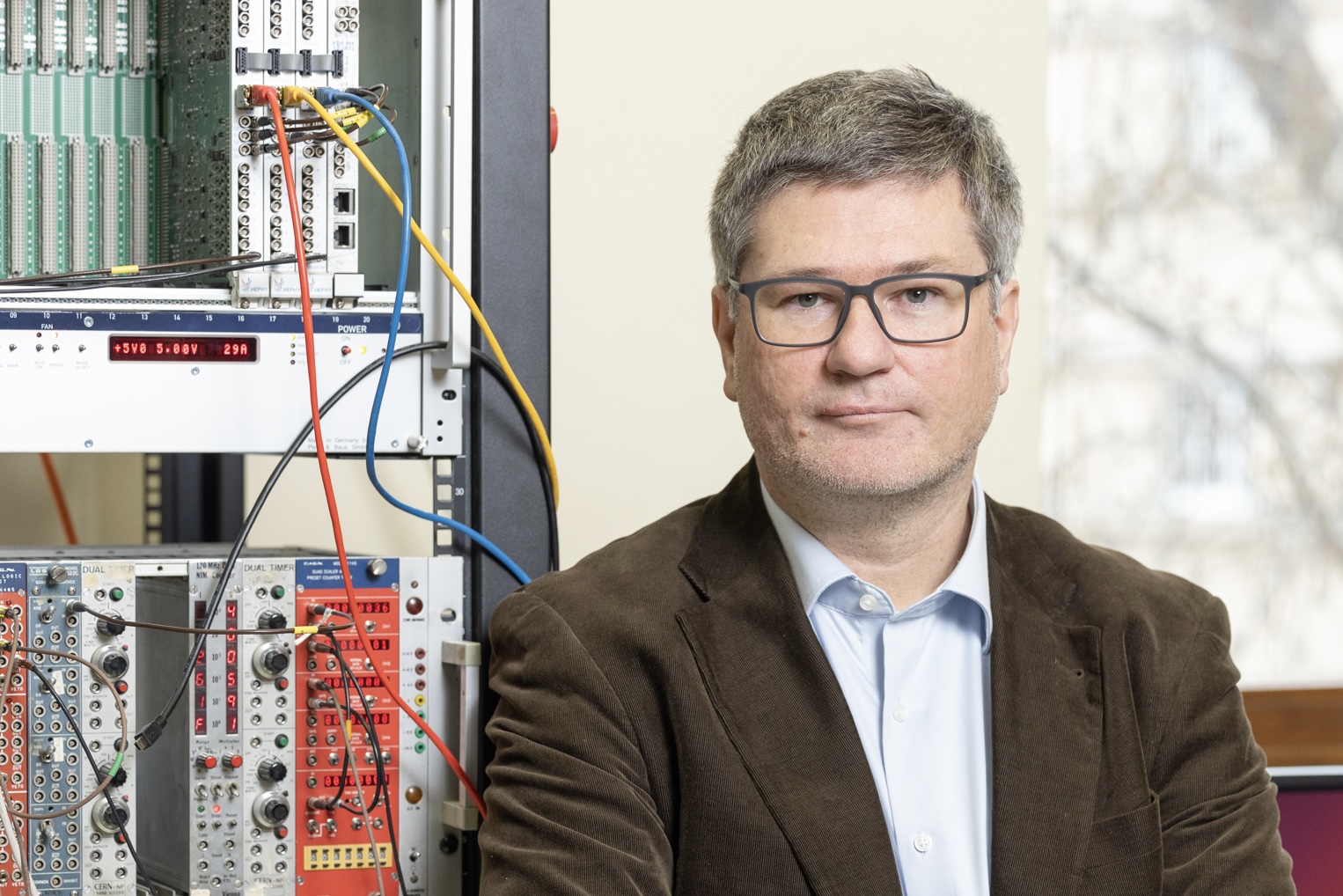
Thomas Bergauer
Group Leader Detector Development
Detector Development
Belle, CMS Tracker, Detector Development
Contact
Email: Thomas.Bergauer(at)oeaw.ac.at
Telephone: +43 1 51581 - 2836
Location: HEPHY
Room: 314
Biographical sketch
Thomas Bergauer performs strategic R&D on particle detectors for future High Energy Physics (HEP) experiments and applications in medical imaging and other domains. He works on high-precision lightweight detectors with an ultra-low material budget for future electron/positron colliders using Depleted Monolithic Active Pixel Sensors (DMAPS), which integrate the sensing element with readout electronics. For hadron machines, he performs research on radiation hard detectors at ultra-high fluences, as well as on precision timing and innovative wide-bandgap semiconductor material like Silicon Carbide. To fully exploit the possibilities of the ion therapy center MedAustron with its synchrotron, he is involved in several projects ranging from beam instrumentation and ion imaging to microdosimetry. He established close collaboration with the semiconductor industry in Austria and internationally for his research.
He has been leading the semiconductor group at HEPHY since 2008 and the department for detector development since 2019, where he is responsible for the operation of the experimental facilities.
Funding
Granted third-party funding
- AIDAinnova: (2021-2024): Second AIDA follup up, now with focus on DMAPS (HV-CMOS sensors)
- AIDA-2020 (2015-2019): AIDA-successor in Horizon 2020 framework (task leader)
- AIDA (2011-2014): Advanced infrastructures for detectors at accelerators (task leader)
- EUDET (2005-2010): Detector R&D towards the International Linear Collider (associated partner)
- FFG Project "RadHardDetSim: Radiation Hardening of Silicon Carbide Particle Detectors using Device Simulation" (2022-2025), project leader (OFFG000345)
- FFG Project "HiBPM: Hi-Precision Beam Position and Intensity Monitor for Accurate Cancer Treatment with Ions" (2021-2024), project leader (OFFG000308)
- FFG Project "DMAPS: Entwicklung eines ultraschnellen monolithischen CMOS Pixeldetektors für ionisierende Strahlung" (2020-2023), project leader (OFFG000291)
- FFG Project "Ion Imaging: Bildgebung mit hochenergetischen Protonenstrahlen für eine verbesserte Krebsbehandlung" (2019-2022), project leader (OFFG000281)
- FFG Project "Entwicklung eines bildgebenden Verfahrens mittels Protonenstrahlen" (2018-2021), project leader (FFG0260)
- FFG Project "Entwicklung von Siliziumsensoren für die Energiemessung in einem Kalorimeter" (2018-2021), project leader (FFG0248)
- FFG Project "Entwicklung von Teststrukturen und -systemen zur Überwachung des Herstellungsprozesses von Siliziumdetektoren" (2017-2020), project leader (FFG0219)
- FFG Project "Strahlenharte Siliziumdetektoren für zukünftige Physikexperimente und Medizinanwendungen" (2014-2017), project leader (FFG0186)
FORMER AND CURRENT POSITIONS
- Austrian Representative in the (Restricted) European Committee for Future Accelerators (RECFA)
- Chairman of the CERN Detector R&D Committee (DRDC)
Memberships in Editorial Board
Guest editor for Nuclear Instruments in Physics Research A
Academic Honors and Awards
- Houskapreis 2014 (2nd rank) with the development of radiation-hard semiconductor detectors with Infineon (Video)
Teaching
- VO+UE "Techniken der Signalerfassung und Auswertung" (VO 141.A88 + UE 141.A89) at TU Wien
- LU "Experimente am MedAustron Teilchenbeschleuniger - Angewandte Teilchenphysik und medizinische Physik" (LU 141.A99) at TU Wien
- PR "Experimentelle Methoden der Hochenergiephysik" (PR 141.A31 and 141.A46), TU Vienna
- PR "Messmethoden in der Hochenergiephysik" (PR 260051), University of Vienna
- VO "Grundlagen der Teilchendetektoren" (VO 141.250)
Lecturer at international schools
- Silicon Detectors in High Energy Physics, at "School on Silicon Detector Technologies" (Institute for Research in Fundamental Sciences), Tehran (Iran), 2011
- Semiconductor Detectors in High Energy Physics at "The Actual Problems of Microword Physics" (Gomel, Belarus, 2009
Research interests
- Development of silicon particle detectors for tracking and calorimeter purposes
- Application of detectors for medical imaging
- R&D on radiation-hard silicon detectors for future HEP experiments
- Precision timing for pile-up suppression in HL-LHC and FCC-hh
- Monolithic detectors with ultra-high spacial precision and low material budget
- New semiconductor materials like Silicon Carbide with superior properties
- Development of the Silicon Vertex Detector of the Belle II experiment at KEK (Japan)
- Industrialization of the production of Si detectors for HEP applications
- Radiation Protection
Outreach activities
Numerous public lectures about particle physics, CERN, particle accelerators like the LHC, the Higgs Boson and applications of HEP research in medical imaging, promoting particle physics to the general public.
Titles and Talks in German:
- LHC -- die größte Maschine der Welt
- Kosmische Strahlung in Alltag und Technik
Audience: Adults (VHS, HEPHY exhibition), Kids (schools),…
Further Information
Social media presence in